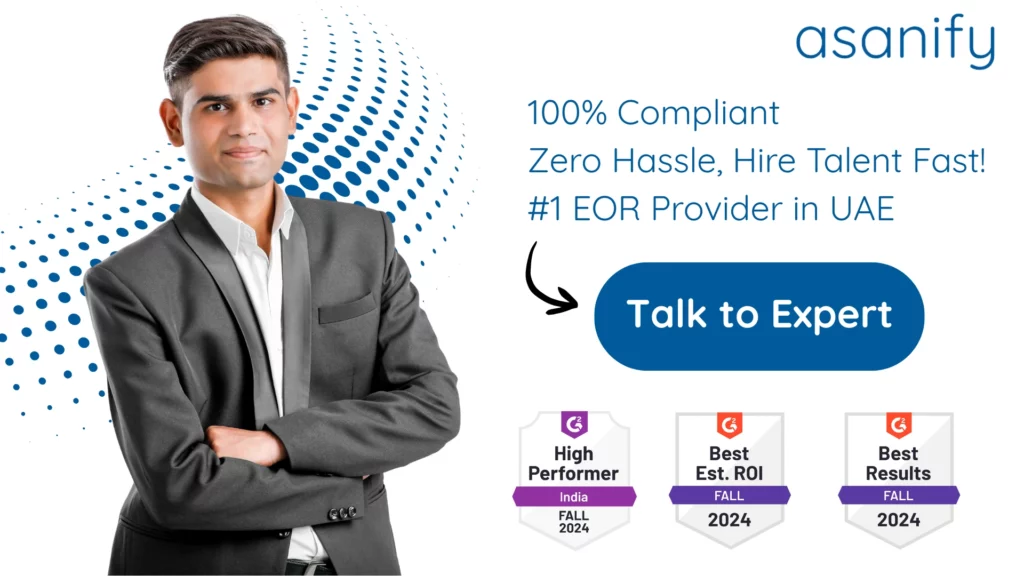The United Arab Emirates (UAE) has evolved into a premier outsourcing and nearshoring destination in 2025, particularly for businesses seeking compliance, multilingual support, and access to specialized talent. Strategically located between Europe, Asia, and Africa, the UAE offers a highly developed infrastructure for high-value outsourcing functions, including legal consulting, finance, IT development, fintech, and multilingual customer support.
Unlike traditional offshore hubs, the UAE provides a unique advantage with its world-class business environment, tax incentives, and legal frameworks that align with international standards. Companies from Europe, North America, and the Middle East increasingly choose the UAE for nearshoring due to its cultural familiarity, time-zone alignment, and robust intellectual property (IP) protection.
Whether you are outsourcing legal processes, IT operations, or leveraging Employer of Record (EOR) services to hire cross-border teams, this comprehensive guide explores the benefits, best practices, and compliance considerations for outsourcing to the UAE in 2025.
Table of Contents
- What is Outsourcing and Why Do Companies Do It?
- Overview of the Outsourcing Industry in UAE
- Why is UAE a Hotspot for Outsourcing in 2025?
- What Types of Work Can You Outsource to UAE?
- Three Commonly Outsourced Services in UAE
- Step-by-Step Guide to Outsourcing to UAE
- Best Practices to Make Outsourcing to UAE a Success
- Pros and Cons of Outsourcing to UAE
- Legal and Compliance Framework in UAE
- Cost Breakdown – How Much Can You Save?
- Outsourcing Projects from the USA to UAE
- Conclusion
- FAQs
What is Outsourcing and Why Do Companies Do It?
Outsourcing is the strategic business practice of delegating internal tasks or services to third-party providers with specialized expertise and infrastructure. Companies outsource to reduce costs, improve efficiency, and access talent or capabilities that may not exist in-house. Outsourcing spans diverse areas like IT development, payroll management, legal research, and multilingual customer support.
It differs from offshoring, which involves relocating operations to a distant country. Nearshoring, such as outsourcing to the UAE from Europe or Asia, allows companies to benefit from geographic proximity and time-zone alignment. Some companies also use staff augmentation, temporarily integrating external specialists into their in-house teams.
Organizations increasingly outsource for strategic reasons—beyond cost-cutting—to improve quality, accelerate time-to-market, and ensure 24/7 productivity. The UAE is especially appealing for its regulatory clarity, global talent availability, and infrastructure that supports high-compliance operations in finance, legal, and technology sectors.
Overview of the Outsourcing Industry in UAE
In 2025, the UAE’s outsourcing industry has become a key driver for companies seeking efficiency and compliance in the Middle East. Dubai, Abu Dhabi, and Sharjah are the country’s primary outsourcing hubs, hosting multinational corporations, fintech companies, and BPO/KPO service providers.
The UAE is known for its world-class digital infrastructure, free trade zones, and business-friendly environment. Popular sectors for outsourcing include:
- IT services (software development, cybersecurity, cloud computing)
- Legal and compliance support
- Finance and accounting
- Multilingual customer service and BPO
- High-end research and analytics
The country has invested heavily in AI, automation, and cloud solutions, making it a trusted hub for high-value outsourcing. Moreover, the UAE’s data protection law aligns with GDPR standards, ensuring global companies can safely manage sensitive information.
Free zones like Dubai Internet City, DIFC, and Abu Dhabi Global Market (ADGM) encourage outsourcing by offering 100% foreign ownership, tax benefits, and IP-friendly regulations.
Why is UAE a Hotspot for Outsourcing in 2025?
Cost-Effective for International Companies
While the UAE is not the cheapest outsourcing destination, it is cost-effective for businesses seeking quality and compliance. Companies from Europe, the U.S., and the Middle East save on long-term employment costs, office overhead, and infrastructure investments by outsourcing to UAE vendors or freelancers.
Freelancers, boutique agencies, and free zone companies often offer flexible engagement models, including project-based pricing, retainers, and fixed contracts. Businesses also avoid liabilities like end-of-service benefits or visa sponsorship costs if outsourcing via EOR or BPO providers.
Skilled and Diverse Talent Pool
The UAE attracts a highly skilled, multinational workforce, including professionals from India, the Philippines, Europe, and the U.S. With more than 85% of its population being expatriates, the country has expertise across finance, IT, healthcare, logistics, and legal compliance.
Leading universities like Khalifa University, American University in Dubai, and NYU Abu Dhabi produce well-trained graduates in engineering, AI, and business disciplines. This talent pool supports high-value outsourcing in areas like fintech, legal advisory, and IT services.
Multilingual and Culturally Adaptive Workforce
English is widely spoken in the UAE, alongside Arabic, Hindi, Urdu, and Filipino languages. This makes the UAE a multilingual outsourcing hub, ideal for serving Middle Eastern, European, and Asian clients.
Customer support and BPO centers offer services in English and Arabic, with many agents trained in cultural adaptability and neutral communication styles—crucial for managing global clients in finance, e-commerce, and SaaS.
Strategic Location and Time-Zone Alignment
The UAE’s GMT+4 time zone bridges Asia and Europe, allowing convenient real-time collaboration with clients across EMEA (Europe, Middle East, and Africa). U.S.-based companies also benefit from overnight processing, enabling 24-hour productivity cycles.
Dubai’s airports and global connectivity make it easy for on-site visits, hybrid collaboration, and vendor audits—critical for regulated industries like finance and legal services.

What Types of Work Can You Outsource to UAE?
The UAE offers robust outsourcing capabilities across technical, legal, financial, and operational domains. Businesses commonly outsource services like software and mobile app development, AI-driven analytics, and legal or compliance support. Additionally, the UAE is a hub for multilingual customer service, HR and payroll management via EOR, and finance or accounting solutions, making it a versatile outsourcing destination. Popular services include:
- Software and mobile app development
- AI and data analytics solutions
- Financial and accounting services
- Legal process outsourcing (LPO) and compliance support
- Multilingual BPO and customer service
- HR and payroll management via EOR
- Digital marketing, content localization, and creative design
- Cloud and IT infrastructure management
With high IP protection and secure digital infrastructure, the UAE is particularly suited for outsourcing projects requiring precision, compliance, and quality.
Suggested Read: Labour Laws in UAE (2025): A Complete Guide for Employers and Employees
Three Commonly Outsourced Services in UAE
1. IT and Software Development
UAE tech firms excel in custom software, AI, cloud, and cybersecurity solutions. Many providers are ISO and SOC2 certified, ensuring data security for global clients.
Companies in fintech, healthcare, and logistics rely on UAE teams for mobile app development, blockchain projects, and DevOps solutions.
2. Legal Process and Compliance Services
The UAE is a regional hub for LPO and compliance outsourcing, particularly in contract drafting, IP law, and cross-border regulations.
Multinational companies benefit from bilingual legal professionals who understand UAE labor law, GDPR, and international arbitration standards.
3. Multilingual Customer Support
UAE call centers and BPO providers deliver multilingual support in English, Arabic, Hindi, and other regional languages.
With advanced CRM tools, AI-driven ticketing systems, and trained agents, the UAE ensures high customer satisfaction and regional market coverage.
Step-by-Step Guide to Outsourcing to UAE
- Understand the UAE Outsourcing Landscape – Focus on IT, legal, fintech, and multilingual BPO. Learn labor laws.
- Define Your Outsourcing Scope – Identify non-core tasks and set KPIs, budgets, and delivery goals.
- Shortlist Vendors – Consider firms like Emaratech, Injazat, and Abu Dhabi IT consultancies. Check certifications and client reviews.
- Request Proposals (RFPs) – Clearly define timelines, compliance needs, and performance expectations.
- Perform Due Diligence – Review licenses, financial stability, cybersecurity protocols, and client references.
- Conduct Virtual or On-Site Evaluations – Assess vendor facilities, team expertise, and communication methods.
- Finalize Legal Agreements – Include NDAs, SLAs, IP assignment, and dispute resolution clauses under UAE or international law.
- Onboard and Train Teams – Share SOPs, brand guidelines, and provide access to necessary tools.
- Set Communication and Monitoring Tools – Use Slack, Asana, Jira, Zoom, and productivity trackers for efficient collaboration.

Best Practices to Make Outsourcing to UAE a Success
- Define clear deliverables, KPIs, and compliance expectations.
- Leverage free zones for cost and tax advantages.
- Schedule regular status updates and quarterly vendor reviews.
- Start with pilot projects before scaling operations.
- Ensure GDPR and UAE data protection compliance.
- Maintain continuous training and brand alignment with outsourced teams.
Pros and Cons of Outsourcing to UAE
| Pros | Cons |
|---|---|
| Multilingual, highly skilled workforce | Higher costs than South/Southeast Asia |
| Strong IP and data protection laws | Limited freelance ecosystem |
| Strategic location with global connectivity | Requires clear legal agreements for dispute resolution |
| Tax-friendly and business-friendly free zones |
Legal and Compliance Framework in UAE
The UAE enforces strong data protection under the Federal Data Protection Law (FDPL), aligned with GDPR, making it ideal for outsourcing sensitive projects.
Key contract inclusions:
- NDAs and SLAs for security and performance
- IP ownership clauses to protect proprietary work
- Clear dispute resolution and international arbitration terms
Free zones like DIFC and ADGM provide:
- Common law frameworks and IP protection
- Predictable cross-border outsourcing contracts
- Access to international arbitration centers
For HR and staffing, EOR providers help by:
- Managing contracts, visas, and benefits
- Ensuring UAE labor law compliance
- Allowing hiring without a local entity
Together, these measures create a secure and scalable outsourcing environment in the UAE.
Cost Breakdown – How Much Can You Save?
| Role | UAE Monthly Cost (€) | U.S./UK Monthly Cost (€) |
| Software Developer | 4,000–6,500 | 8,000–12,000 |
| Legal Advisor | 3,800–5,500 | 7,500–10,000 |
| Support Agent | 2,200–3,200 | 4,500–6,500 |
Savings come from reduced office costs, tax benefits, and flexible vendor pricing models.

Outsourcing Projects from the USA to UAE
U.S. companies are increasingly outsourcing to the UAE for IT development, fintech solutions, legal compliance, and multilingual customer support. The country’s skilled talent, strong infrastructure, and strict data protection laws make it ideal for secure and efficient operations while supporting business expansion in the Middle East.
Its strategic time-zone advantage allows overnight productivity and faster project turnarounds. By leveraging UAE providers, U.S. firms gain high-quality output, regulatory compliance, and scalable global support, making the UAE a top outsourcing choice in 2025.
Use Cases:
- U.S. fintechs leveraging UAE AI and cloud expertise
- Legal teams outsourcing contract review and compliance audits
- E-commerce firms hiring bilingual support teams for Middle East expansion
The UAE offers overnight productivity, secure infrastructure, and regulatory peace of mind for American firms.
Suggested Read: Employer of Record UAE: A Comprehensive Guide
Conclusion
Outsourcing to the UAE in 2025 is a strategic advantage for companies prioritizing compliance, talent quality, and global scalability. With its world-class infrastructure, diverse talent pool, and business-friendly regulations, the UAE is ideal for high-value, secure, and scalable outsourcing.
To streamline your outsourcing journey, partner with Asanify to connect with vetted UAE vendors and EOR providers for seamless onboarding, compliance, and growth. Our platform simplifies payroll processing, ensures adherence to UAE employment laws, and manages employee onboarding for remote or in-country hires. By leveraging Asanify, businesses can reduce administrative burden, stay compliant, and scale operations confidently in the UAE.
FAQs
Yes, the UAE is ideal for high-value outsourcing, especially in IT, legal, and multilingual support.
IT, fintech, legal services, finance, and BPO are the top industries.
Yes, English is widely spoken, along with Arabic, Hindi, and other regional languages.
The UAE offers stronger compliance, better IP protection, and strategic time-zone alignment.
Yes, especially through free zone vendors, freelancers, and flexible engagement models.
The UAE Federal Data Protection Law and free zone regulations govern outsourcing and IP protection.
Not to be considered as tax, legal, financial or HR advice. Regulations change over time so please consult a lawyer, accountant or Labour Law expert for specific guidance.

